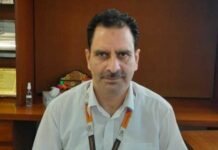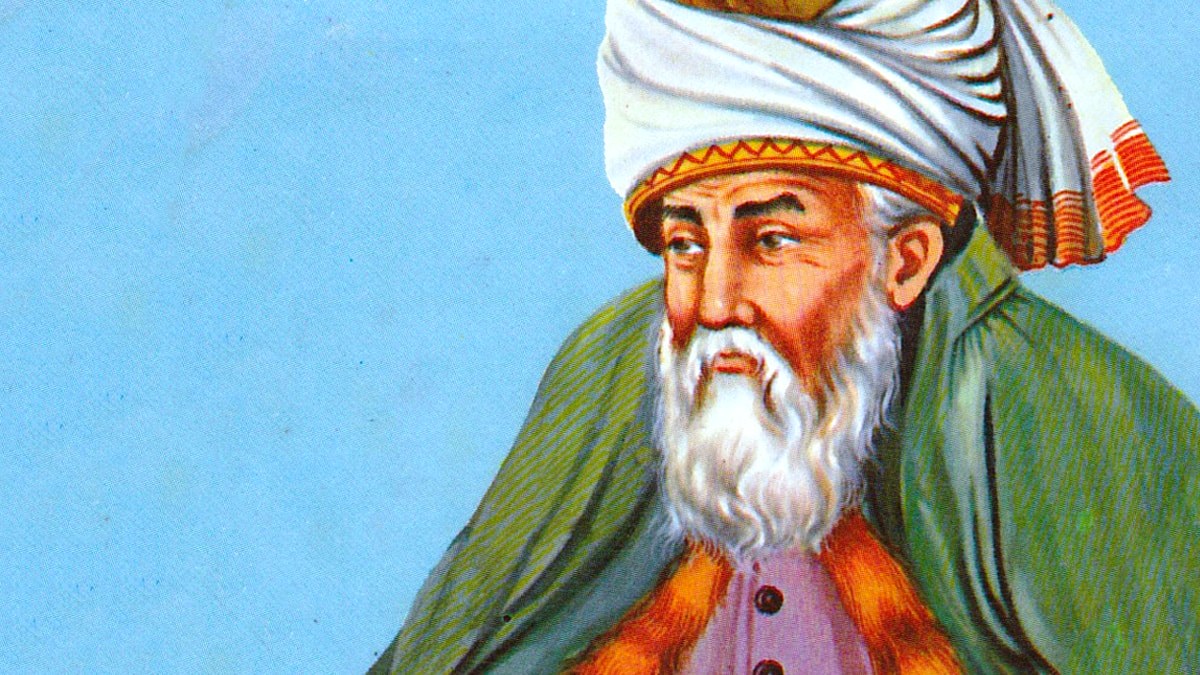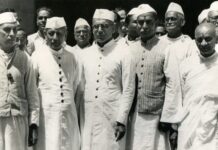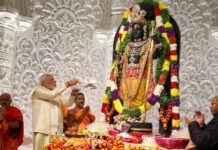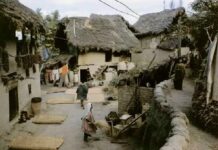Lt Gen Brij Mohan Kaul, the Lahore-born Kashmiri Pandit soldier, was a young colonel when he was posted in Kashmir in 1948 spring to manage the JK Militia. Though having a direct line to the Prime Minister, Jawahar Lal Nehru, Kaul was shifted out in October. In his memoir, Kaul details the war and his brush-up with Sheikh Mohamad Abdullah

On 25 April (1948), I flew from Delhi to Kashmir to take over my new assignment. Maj Gen KS Thimayya was in the same plane to assume command of our forces in Jammu and Kashmir. Two days later I accompanied Thimayya to Poonch. The flight to this garrison was, as always, a tricky affair because the aircraft had to take a precarious turn over a nullah and come tortuously onto its airstrip, skirting dangerously past enemy positions nearby.
Thimayya heard that a large number of warring Pathans were meeting in a jirgah (tribal council), not far from Poonch. He conveyed this significant information to the Army and Air Headquarters, Delhi and asked for an air strike on this sitting target. Generals Bucher and Gracey, the Indian and the Pakistan Army Chiefs, then got in touch with each other. No one knows what they talked.
At the end of their pow-wow, Bucher warned our government that if an air strike was carried out on these Pathans, Pakistan might take this reprisal seriously enough to declare war on us. (As if we were playing cards with Pakistan, as things stood!) So these Pathans were left untouched only to fight us wherever they chose and we preferred to take advice in this matter from a foreign General rather than one of our own, such as Cariappa or Thimayya.
(During one of my discussions with Nehru about this time, I suggested that we should hit the Pakistan bases. Nehru said he was not in favour of extending our operational activities against that country because he had been assured by his advisers that Pakistan would collapse financially in a matter of months as its creaking economy could not bear the burdens of a war for long. I remember telling him that one of the major Power blocs would ensure that Pakistan does not ‘disappear’ on account of money. No country, however small, was allowed to ‘die’ by interested parties, because of financial difficulties. It was to the advantage of one country or another to come to her aid ‘in her hour of need’. Later events proved that Pakistan grew stronger, and not weaker, with the passage of time.)
In Uri War Theatre
I was driving Thimayya’s jeep on the way to Uri. There was a nip in the air and the fragrance of pines around. As we reached Mahura, we were warned by the local commander that between there and our destination the enemy was sniping the road from the other side of the river. It was customary for a certain senior commander here to travel in such conditions in an armoured car for personal safety. Thimayya, however, thought a commander should move about in battle within view of his men and not sheltered inside an armoured car. We, therefore, resumed our journey in a jeep, driven by me, and as we were turning a corner on this winding uphill road, a South Indian soldier came rushing towards us and blocked our way. He was hatless and dishevelled and belonged to a Madras battalion, located not far from where we were. He said his Commanding Officer, Lt Col Menon, had just been ambushed by the enemy.
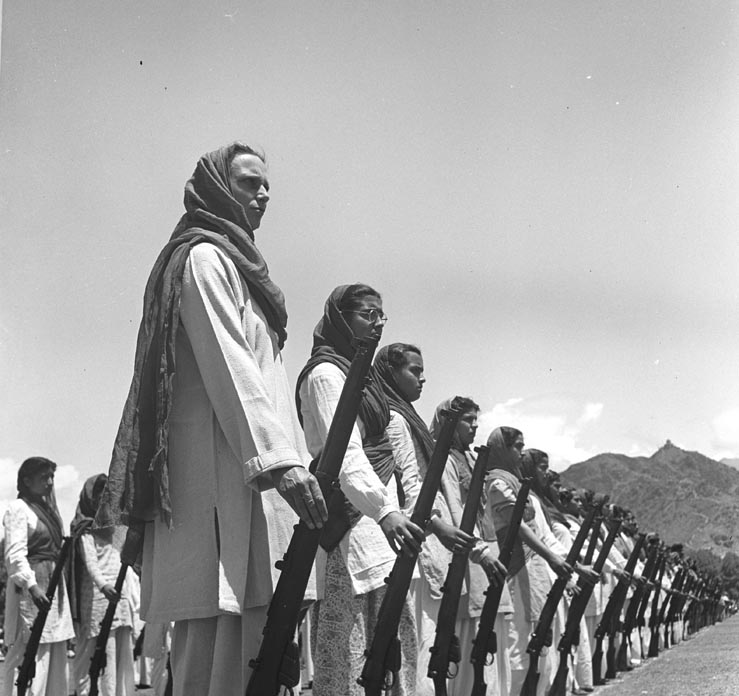
Early that morning, a ‘friendly’ Bakarwal, (a nomad) in reality an enemy agent, woke up Lt Col Menon and told him that the Pakistanis had overnight infiltrated up to a point adjacent to his battalion headquarters and that if required he could show him where this was. The Colonel, a gallant and inquisitive man, at once agreed to accompany his informant and to get to grips with the enemy. They had barely gone a few hundred yards, when the Bakarwal himself took cover behind a boulder and signalled Menon to carry on.
Poor Menon unsuspectingly walked straight into an enemy trap and along with some of his men was shot dead. The man who had related this account was the odd survivor.
General Thimayya and I, on hearing this story, jumped out of the jeep and rushed up towards the scene of this action. It was perhaps not prudent to do so as we might have been ambushed also, but then every action is not logical in war. Thimayya was anxious to see where one of his subordinates had lost his life and set a good example to others in the field in doing so.
Grand Welcome
When I first reached Srinagar, Sheikh Abdullah, arranged for me a huge rally of the Militia I was taking over. He was there himself and introduced me to this force, relating how hurriedly it was raised when Pakistan attacked Kashmir and describing brave deeds by many Kashmiris including Zadu who sacrificed his life near Tithwal.
(I found this force needed brushing up in discipline, tactics and shooting. I, accordingly, took adequate steps to raise its military standards. I must admit, however, that to have initially organized this Militia in a crisis from a scratch was an excellent effort on the part of the Kashmir leaders.)
In Handwara
The Army High Command decided to launch a two-pronged attack on the enemy: one near Uri and the other near Handwara so that both the drives should meet near Domel-Muzzaflfarabad. I was asked to commit two Militia infantry battalions to these operations. In view of the urgency of the occasion, I hastened to prepare the requisite units to participate in these two offensives. I found, however, that many of them needed improvement physically, in handling their weapons or in minor tactics. Yet, they had to make a start sometime. So they took up positions with 161-Brigade at Uri and 163-Brigade at Handwara.
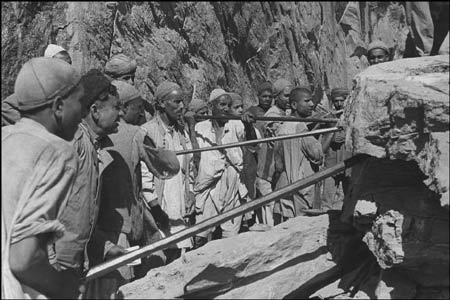
Thimayya and I went up to the Nagi Picquet in 163 Brigade commanded by Brigadier (now Lt Gen) Harbakhsh Singh. It was situated on the top of a spur, half of which was held by us and the other half by Pakistanis. We struggled up the hill, and passed through some dead ground which the enemy was sniping.
The operation in Handwara began on 16 May. A day before, a man called Nazir, once a forest officer and now at the disposal of the army, voluntarily went out in disguise to penetrate the enemy’s forward-defended localities and bring back whatever operational information he could. After staking his life in a deadly situation, he returned the next day triumphantly, with invaluable ‘intelligence’ about the enemy.
Harbakhsh then launched his attack with 163 Brigade boldly and pushed the enemy back to Tithwal. I remained during this operation with him and the troops on the 16th and 17th as I had one of my Militia battalions here. But for lack of logistical support, he would have exploited this success further.
Uri Battles
I reached Uri on 18 May, the plan was for 161 Brigade to capture the heights of Islamabad feature held by the enemy opposite Uri and resume our advance to Domel.
It was reliably learnt that the enemy used to virtually abandon his position at the top of the Islamabad feature, holding it lightly and spend the nights at lower and warmer altitudes, on the reverse slopes. It was accordingly decided to capture this feature by a surprise night attack and the Second Dogras were entrusted with this job.
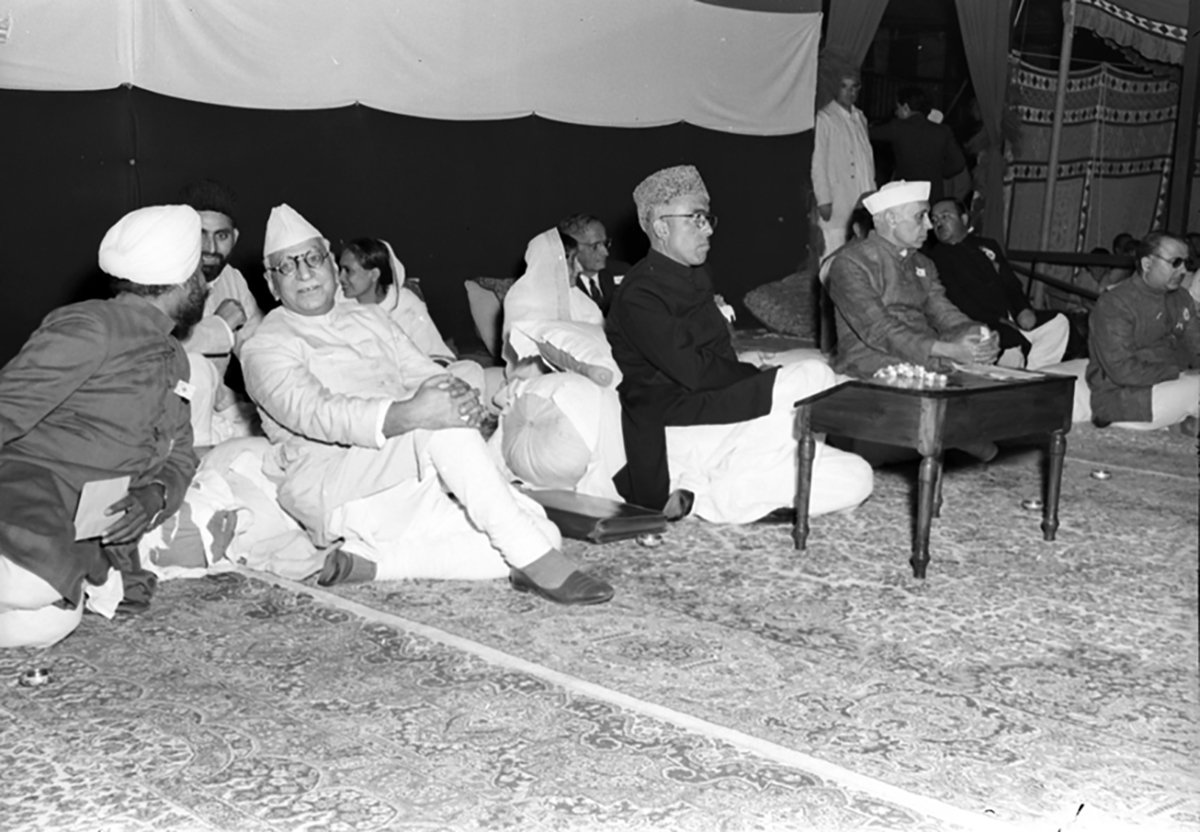
A day before the attack, – when reached Uri – our men, were caught in the enemy mortar and artillery bombardment and suffered many casualties. The Brigade Commander and I, as also some others, had a taste of some shelling as we lay trying to locate enemy positions in an area called the ‘Fort’. On the D day, the Dogras quietly assembled near the Uri bridge, held their breath and looked at their watches. There was pin-drop silence and an air of excitement. At the tick of H hour, which was ten at night, they slipped across the Forming-up place on their tip-toes and started going up the massive Islamabad feature. The plan was to storm its heights before first light and catch the enemy unawares. But, somehow, our men look longer to crawl up this position and, in the meantime, the enemy, getting scent of their advent, stole a march and were ready to give us a hot reception from the top.
When the Dogras, instead of capturing their objective, got involved in a battle, the Brigade Commander had to send 66 Rajputana Rifles to retrieve this situation later.
If the delay in the capture of the Islamabad feature had not taken place and the operation had come off as originally planned, we would have had the enemy on the run and might well have captured Domel. Now he got time to consolidate his positions all along the route, anticipated our moves and frustrated our plans.
During the previous night, before the Rajputana Rifles saved the situation, the Brigade Commander and I sat all night in a forward position, frozen in the cold and wondering how the attack of 2 Dogra was progressing. As the Commanding Officer was hugging the roadside and was miles away from the men he commanded, he was out of the picture. He was, therefore, in no position to send back any news of how the attack was going, whilst we waited to hear from him. During the same night, we saw a multitude of lights going up the Haji Pir Pass which confused us completely. Was the enemy coming upon us from our rear or the flank, or was he withdrawing to some other point? Later, we discovered that it was only a diversionary move and a ruse on his part.
During the next three days or so, I found myself amidst a ding-dong battle which followed. The enemy had set up a strong position astride the main road. Lt Col (now Maj Gen) ‘Sparrow’ Rajinder Singh and I were standing near a point swept by enemy fire when Lt Col Oberoi of the Gorkhas came up from Thimayya’s headquarters and asked us where the Brigade Commander was, as he had an important message for him. We told him Brigadier Sen was near a hut just beyond, but as the enemy machine-gun fire prevented anyone moving further, we suggested he should wait and we would all go together. Oberoi ridiculed our caution and proceeded forward. In a fit of bravado, Rajinder
Singh and I also staggered ahead. We had hardly covered a few yards along the road when a burst of machine-gun fire whizzed past us, over our heads, missing us narrowly. We fell on the ground in double-quick time to get below the level of this hail of bullets. Oberoi, a brave officer, now saw, good-humouredly, that our earlier warning to him had some meaning.
7 Sikh were given orders to advance on the left of the road by eight on the night of 21 May and capture a certain height. They came under heavy fire and could not make much headway. Our main effort, on the road, also encountered stiff opposition. Our right hook by the Kumaonis, led gallantly by Lt Col (now Lt Gen) MM Khanna, however, went well but had to be halted lest it out-stretched itself logistically. The Brigade, as a whole, came to a standstill after a little more fruitless fighting and our advance petered out not far from the 58th mile-stone on the Uri-Domel Road.
Thimayya had made a bold bid for Domel. He was a good leader himself, and though some of his subordinate commanders fought well, he failed to capture his prize.
A Crisis In Ladakh
In August, a frantic signal was received from the Leh garrison commander, Lt Col Prithi Chand, to say that as he had been told by the authorities to fight to the last round and the last man, he must comment that though he had the will, he did not have the means to do so. He added that unless his shortages in men, ammunition, rations and clothing were made up, he must inform all concerned clearly that he would not be able to hold on to Leh for long, in view of overwhelming enemy pressure.
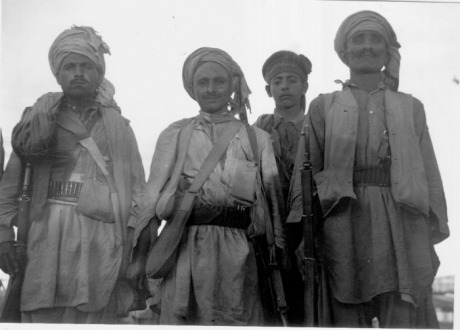
Thimayya sympathized with all concerned when they were in such a predicament. I had come to see him in some other connection, soon after he had received this signal. When he read it out to me, I volunteered to go to Leh so that I could report to him objectively what the situation was like. He agreed to my request and the next morning I flew to Leh.
The air route to Ladakh ran via Zoji which was still in enemy hands. When our Dakota was flying above the pass, the enemy opened machine-gun fire, hit one of its wings but the plucky pilot landed us at Leh safely a few minutes later.
Leh was 11500 feet high and was surrounded by picquets up to altitudes of 16,000 feet. In those days during their halts at Leh, our aircraft never switched off their engines, lest they froze and flew back to Srinagar within fifteen minutes.
On arrival at Ladakh’s capital, I met Lt Col Prithi Chand, who had occupied Leh overland earlier during winter, a creditable feat. He was a gallant and colourful soldier. We had about 400 men here as against the enemy’s 1,300. There were two companies of 2/4 Gorkhas and some battered remnants of the Jammu and Kashmir State Forces who had been withdrawn from Pakistan and Kargil.
The garrison was woefully short of supplies and clothing. Cooking and boiling water at this height was a problem. Men were worried about their families from whom they had received no mail for months and we had cases of septic wounds due to lack of medical facilities. Yet, even in these circumstances, there were examples of individual gallantry.
I also met here Major Hari Chand who was commanding a company of 2/8 Gorkhas. He was a fearless soul, having many successful actions to his credit. Our garrison had only small arms and little ammunition. The enemy had, however, hauled up a 37-inch howitzer and placed it at a commanding position which Hari Chand promised to neutralize. He caught the enemy napping, raided this position, destroyed the gun and killed its crew who were fast asleep in a shelter by its side. For this and other acts of gallantry, and having seen the conditions in which he was operating, I initiated a recommendation, to General Thimayya, who supported it to higher authorities for the award of Mahavir chakra which he was duly granted.
Subedar Bhim Chand was at Tharu, about twelve miles beyond Leh where I met him. He had become a hero with the local villagers as he had saved their villages from many enemy onslaughts. One day he heard that his wife had died in his village, leaving behind two children. He was very upset to hear this news and asked for short leave to settle his domestic affairs. The leave, of course, was promptly sanctioned but within minutes the villagers at Tharu, a military stronghold, flocked around their saviour and asked him to postpone his departure as they feared another enemy attack and as they thought only he could save them.
He was on the horns of a dilemma: should he go to his children, who had lost their mother or should he remain at his post, in a critical situation, and save many innocent people here? After much deliberation, and with a lump in his throat, he decided to stay on in Tharu, for a few days more, and stick to his post. And in the ensuing battle, he lived up to the hopes of his admirers. For this devotion to duty and other acts of bravery, I forwarded to the higher authorities a recommendation for the grant of Vir Chakra which he was awarded.
After living with this beleaguered garrison and seeing their grim situation and the gallant way they were standing up to it, 1 returned to HQ 19 Division by air and reported to Maj Gen Thimayya what I had seen.
Ramban Kidnappings
Two young Dogra girls, Sita and Sukhnu, were abducted from village Sumbal near Ramban by some Bakarwals. When their father appealed for assistance to Lt Col Ranbir Singh, MC, the Commanding Officer of a Rajput Battalion located near Banihal, he, in his chivalrous attitude, readily rose to the occasion and detailed a party of soldiers to bring back the girls from wherever they were. In their quest, they came into clash with armed Bakarwals and without retrieving the girls were apprehended themselves.
An inquiry was then ordered by Delhi to bring to surface all facts in this case and I was appointed its President. Abdullah did not cooperate with this court in many ways. We had difficulty in getting some witnesses.
Abdullah tried to make a political issue out of this case. He threatened to resign and warned Nehru that unless stern action was taken against a group of Indian troops (on charges which were never proved), ‘the repercussions on the population of Kashmir would be serious.’ This was his favourite argument but Government of India earned on the inquiry all the same.
It was alleged these two girls had been abducted from their village, moved from pillar to post on foot over the Pir Panchal range, and ‘married’ to several Bakarwals in turn during the last few months. I also understood that one Shambhoo Nath had been arrested by Abdullah on a fake allegation and was now under arrest in Srinagar. In those days if Abdullah could level no other plausible charge against men he did not approve, he used to label them as RSS (Rashtriya Sevak Sangh) workers. He could then punish them on ‘secular’ grounds.
We eventually managed to get Shambhoo Nath before us for giving evidence and heard his harrowing tale. He had been President of the National Conference at Verinag and just because he acted as a guide to some Indian troops, in the recent affray, he had lost his ‘importance’ all of a sudden, was labelled as an RSS worker and jailed. He alleged he was made to march bare-footed and shackled. Shambhoo Nath showed me deep marks of the beatings (by the authorities) he had received on various parts of his body so that he should be compelled to confess imaginary crimes he had never committed. History seemed to have receded back to mediaeval times. I reported this case to Sardar Patel informally.
When Shambhoo Nath was eventually released, he was afraid his life would be in danger in Kashmir. I, therefore, got him a job in a factory near Delhi and slipped him out of Kashmir in a military lorry. I then wrote a scathing report on this case which went through proper channels to Government. I heard that Abdullah approached General Bucher for help. Bucher ignored my report and recommendation and initiated, instead, a case against our Rajput soldiers on various charges. These men were, however, released later for want of evidence. Bucher also tried to be vindictive towards Lt Col Ranbir Singh, MC, Commanding Officer of the Rajputs and Brigadier (later Lt General) Bikram Singh, the Brigade Commander, to placate Abdullah.
Gen Francis Robert Roy Bucher
General Bucher’s appointment as India’s Commander-in-Chief was far from well-received in the Indian Army. Some renowned British officers like Lockhart and Russel had not been appointed to this post perhaps because they were independent and outspoken, Bucher, on the other hand, had a mediocre military record, having commanded nothing much in his career.
I had come from Kashmir to Delhi to attend a conference and was having breakfast with Nehru. After the normal chit-chat, I raised before him, with due apologies, a delicate topic; whether it was proper that Roy Bucher whilst he was India’s C-in-C should occasionally ring up Gracey, Pakistan’s Army Chief, exchange operational information mutually and discuss with him various operational matters over the telephone whilst the two countries were at war.
What kind of a war was being conducted, in which the two opposing Chiefs seemed to be hand in glove? I also asked whether it was correct for Bucher to have resisted an air strike by us against the concentration of a large number of militant Pathans in the Poonch Sector, specially when they were bound to pose a threat to us later if spared then. Whatever the reasons, was it ever fair to spare the enemy in war, when we knew that he would try to kill us instead, if he could. I ended up by saying that I thought Bucher enjoyed little prestige in the Indian Army nor did he wield much influence in the British War Office. What, then, was his function in life, I asked. I also remarked that, if Bucher went to London, as I had heard he was going, on a procurement mission for military equipment, I was sure that as he enjoyed little influence with the British authorities in UK, he would bring back hardly anything we needed.
Nehru took my tirade against Bucher with a pinch of salt and did not encourage any further conversation. He often did that when he did not wish to discuss an unpleasant topic. I heard later that though Bucher did go to UK on an urgent procurement mission (for military equipment) he returned from there almost empty-handed, bringing back with him many ifs and buts. When I asked Nehru, how Bucher had fared in London, he admitted he had not done too well.
When Bucher left and Cariappa became India’s Commander-in-Chief a few months later, this step was universally approved in the Indian Army.
Sheikh’s Interventions
I had quite a rough passage with Abdullah when I found him interfering with the Militia which I commanded. Pressure was put in cases of promotions and discipline.

As I brooked no interference, I became a persona non grata with Abdullah. One day a militia soldier had been arrested for a serious crime and was to be tried by a Court-martial whilst I was away to an operational front on an Id day. Abdullah ordered my subordinates through his staff, in my absence to release this man as a part of general amnesty on that auspicious Day. I later heard that the culprit, instead of being given exemplary punishment, as he should have received, was given by Abdullah an assignment in the police. I created much din and noise but it was like crying in the wilderness. No brass hat took any notice of what I said. Politics was reigning supreme in military affairs.
A few days later, a soldier who had been convicted for a certain crime went on hunger strike in protest. Here was a political stunt creeping into the army again. I, therefore, thought I better deal with this sort of tendency without mercy. Accordingly, I gave orders to Lt Col GS Puri, my competent staff officer, that this man, even if he gave up his hunger strike, should be given no food for a day or two thereafter and kept alive on water. It would do him some good if he learnt a lesson the hard way.
In the meantime, while he refused to eat, I made him run around a sports ground with a heavy load on his back, even if he malingered. When this ‘political’ soldier nearly passed out, I was asked by one of Abdullah’s spokesmen to deal with him leniently.
I told him I was only discouraging indiscipline from creeping into our ranks and that no pity need be shown in cases where an example was to be set. But when one decides that principles are more important than propriety, it is not uncommon to be misjudged.
Kishtwar Crisis
In mid-summer. Sheikh Abdullah sent for me and said that according to his information, there was much communal tension in Kishtwar and that I should therefore take a J and K Militia unit composed of a particular community there in order to restore the confidence of the local population.

I told him that it was customary for us not to nominate troops by communities in the Indian Army and allotted them only specific tasks; and that as such, I would take with me any troops that were available. I think Abdullah
reported this case to higher military authorities—as if I was doing something wrong—and I was asked to give various explanations. When, however, they heard that a communal tinge was being given to a simple case, they did not interfere with me any further
I understood that Adalat Khan, an ex-Lt Colonel of the Jammu and Kashmir Forces had migrated to Pakistan earlier but had now been recalled by Abdullah and made Administrator of Kishtwar. Mrs Krishna Mehta, who was working in Nehru’s household and whose father lived in Kishtwar gave me a totally different version to that which Abdullah did.
I marched with about a hundred men of the 12 Punjab Paratroopers from Batote and after covering 65 miles in torrential rain reached Kishtwar, in two and a half days. Lt Col (now Brigadier) ‘Kim’ Yadav was commanding a militia battalion there. He was ADC to Lord Louis Mountbatten during 1946-7 and an outstanding officer. I found great dissatisfaction prevailing in Kishtwar, not as painted by Abdullah but to the contrary and that Adalat Khan was certainly not proving to be an ideal administrator.
After taking some immediate and salutary steps through Kim Yadav which restored public confidence, I returned to Srinagar via Pir Panchal. But as it took me 3/4 days to march back, before I reached the Kashmir capital, Adalat Khan had, in the meantime, sent a report to Abdullah, complaining against my visit to Kishtwar and the ‘highhanded’ actions I had taken. He had done this as a defensive measure because his maladministration had been exposed for the first time.
When Abdullah confronted me with this allegation, I told him it was baseless and that I had done nothing which could be termed improper. He, however, sent in an exaggerated report to Nehru, threatening that he could no longer assure him of Kashmir’s continued political support if cases of ‘this’ nature were allowed by India to take place. Also, that some of his ministers were threatening to resign on this issue {sic), Nehru was naturally indignant, not knowing what the facts were, called me down to Delhi forthwith and without hearing my side of the story, said angrily: ‘Seikh Abdullah had conveyed to me the gist of your recent actions in Kishtwar. I just don’t understand. What do you think you are? If you go on like this, you will lose Kashmir for India one day.’
‘But do you know the facts, sir?’ I asked.
‘It is enough for me to know that you have fallen out with Sheikh Abdullah, whatever the circumstances. We cannot afford to be at loggerheads with him. I thought you of all people knew better, he said loudly, fuming with rage. I kept quiet because I thought that if facts were not important and politics was above conscience, I had nothing to say.
‘Why don’t you say something?’ Nehru asked.
I was sulking now and said: ‘Sir, If you don’t want to know facts and have already made up your mind to judge my actions in Kishtwar as wrong, without giving me a hearing, there is no point in my saying anything.’
Nehru was at the point of saying something more when he suddenly left the room in a huff.
The next morning Nehru sent for me again. He now greeted me warmly and asked me to relate to him the details of what I had seen in Kishtwar recently. He seemed a different man. I wonder if someone had spoken to him in the meantime. Anyway, I began by saying that he himself had sent me to Kashmir, at the recommendation of the Jammu and Kashmir Government, on my return from America, for national considerations. As for Kishtwar, I was sent there at Abdullah’s request. I went on to say that I had by personal observation in Kishtwar, found that mismanagement of administration prevailed in that isolated district where many of our service rifles had fallen in the hands of unauthorized individuals who, with these and other weapons, had done much mischief; where several young girls had been abducted forcibly and married to undesirable men; and where many other similar crimes had been committed.
I ended up by saying that I was bringing this and some other cases to official notice so that stern action could be taken lest this state of affairs under Abdullah if not put right, may have a comeback on us one day. I then took this opportunity and related to him many other undesirable activities going on in Kashmir under Abdullah.

Nehru heard all I had to say with patience. After a long pause he explained to me the various baffling aspects of the Kashmir politics and the need for us to remain friendly with Sheikh Abdullah. He said he was pained to hear what I had to say but, for various practical considerations, there was little he could do in the matter. He then said that the rub of the whole thing was that Abdullah had asked for my removal from Kashmir as he found my presence a hindrance in his work. Nehru said though he felt I was not to blame in any specific way, it was difficult for him to ignore the request of Abdullah, who was, after all, the Prime Minister of Kashmir and with whom I had fallen out.
He said it was easier for him to remove an individual like me than to remove Abdullah.
Nehru reminded me that if an individual came in conflict with the head of a government, it was the individual who usually went. He told me that consequently, it would be necessary for me to be posted away from Kashmir, though I would be kept as near it as possible. He then sent a letter to the Army Chief confirming this decision and sent me a copy. I left Kashmir in October 1948. I had learnt much there in a war which had kept swinging like a pendulum and lived in a political situation with hardly any parallel.
(These passages were excerpted from General BM Kaul’s memoir, The Untold Story, which was published in 1967.)


